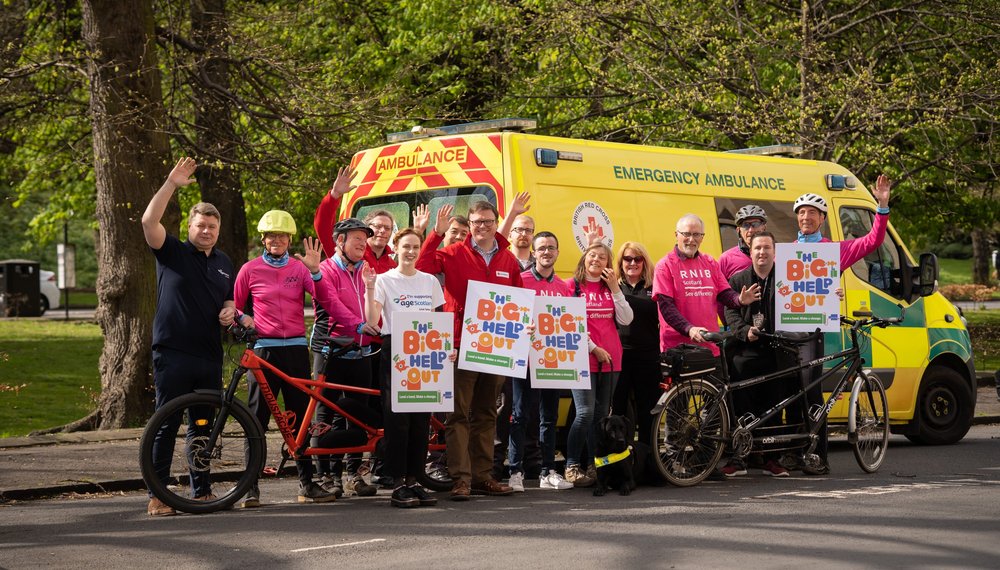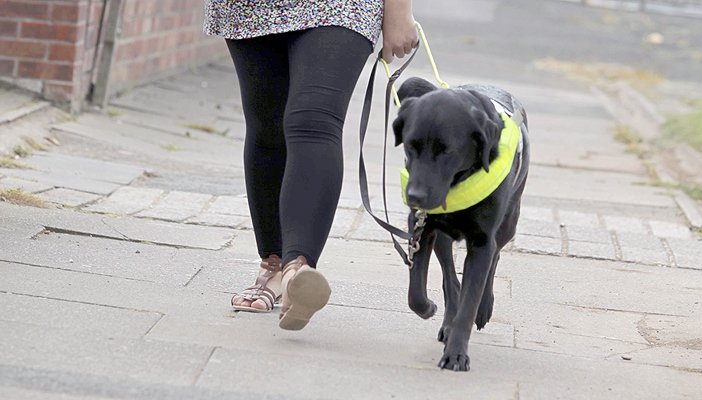Donate a little time to RNIB this Spring
As part of the Big Help Out 2024, we’ve several light touch and one-off opportunities for you to give volunteering a go.

Anyone can join in The Big Help Out, including existing volunteers and RNIB staff. It’s a great way to get involved for the first time. Please share the message with your friends and family.
Matt Stringer, RNIB’s CEO, said this is a great opportunity: “We’re proud to involve volunteers in our work at RNIB and are delighted to be taking part in the Big Help Out, so we can involve more people."
Volunteering can include a campaign action like signing a petition, doing a one-off activity for a few hours or less, lending a hand occasionally with something that interests you, or doing a more regular role.
“It just brightens up a bad day to volunteer!”
RNIB Talk and Support volunteers Huda and Alia have told us why volunteering makes a big difference to everyone involved.
The sisters, who are studying Optometry, are Telephone Group Facilitators for RNIB’s Talk and Support groups, which connect people with sight loss around shared interests and enthusiasms.
Some easy ways for you to get involved
Join a Volunteering information session
To mark the first of three days of the Big Help Out main activity, we’re hosting two online information sessions on Friday 7 June. Come along at 10:30am or 2:00pm for 40 minutes, and we’ll share what we do at RNIB and why, the difference that people make who donate their time to our work, and the current opportunities to lend a hand or volunteer.
Be a clear streets champion
As blind and partially sighted people we live in local neighbourhoods right across the UK.
Pledge to become a clear streets champion and tell us where you're based so we can keep track of where people are active in keeping streets clear of obstructions and hazards.
You can make our lives so much better by making these six simple things part of your daily routine:
1. Get pruning
Plants and trees are fantastic, but they can quickly become a nuisance and hazard on the pavement. Keep the plants in your garden trimmed so they don't obstruct adjacent paths.
“When I walk with my long cane it won’t pick up an obstacle above my waist height, which means I’ll still get hit in the face and body with foliage. I’ve experienced cuts and grazes to my face before as some shrubs and trees have spines or thorns.” - Niall
If you come across a property with a tree or shrub causing a significant barrier, see if you could find an opportunity to alert the owner. Alternatively, you can report it to your local authority using this tool. They can then write to the property owner with a request to cut back the obstructing foliage.

2. Be bin-tidy
On bin day, park your wheelie bin at the end of your drive, or to the back of the pavement, against your garden wall or fence.
Admittedly, rubbish collectors don't always leave bins back in the same place, so if you walk down your street and find a bin in the middle of the path, moving it back to the rear of the pavement can make all the difference.

3. Keep the lights on
Good lighting is important for many people with limited sight. We're enjoying lighter evenings now. But, come the end of October when the clocks go back, many people find the increased hours of darkness a barrier to getting out and about. If you spot any streetlamps in your neighbourhood that aren't working, report this to your local authority or their nominated contractor. Many lamp posts have a reference number on them which you can use for reporting purposes. When you are visually impaired, you may not be able to see the reference stamped on the lamp post, preventing you from reporting the failure yourself.

4. Pick up after your pooch
Most people pick up after their dog; it’s so important to do this as many of us can’t see to avoid pavement mess.

5. Park like a pro
Keep pavements clear when you’re parking a vehicle or electric scooter, so that you’re not causing an obstruction.

6. See it, say it, sort the hazard
Always notify your local authority of any faulty controlled crossings, unmarked holes in the ground, or anything else that could be a hazard or obstruction on the pavement. You can do this by using this tool. Or send them a quick Tweet. Sometimes that’s all it takes to sort out a problem.
“I was walking near my home one day with my guide dog when my right shoulder brushed an object. It turned out to be a pole with a parking sign that a vehicle must have hit. It was leaning right over into the pavement from the kerb. My guide dog went slowly but couldn’t avoid it. If I was walking with my cane that day, I could well have hit my head on that damaged pole in the narrow path.” - Niall








